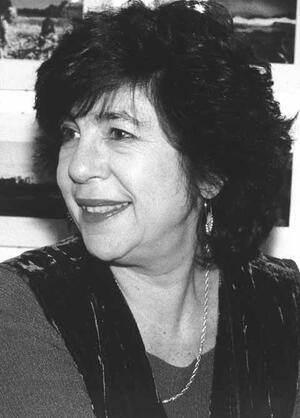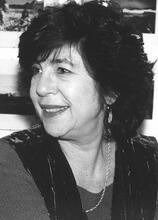Lilly Rivlin
Photographer: Jonathan Marx
Institution: Lilly Rivlin
Born in Jerusalem, Lilly Rivlin is a documentary filmmaker whose films are centered around feminism, the Arab-Israeli peace process, Jewishness, and her family relationships. Rivlin went to high school in Washington D.C., where she was an active Labor Zionist and head of the city’s Habonim chapter. Her political activism continued throughout the McCarthy era; on Black Friday in 1960 she was among those who protested the House Unamerican Activities Committee’s visit to San Francisco. Lilly was in Israel during the Six Day War, an experience which cemented her life-long dedication to Arab-Israeli peace. In 1972, she established herself permanently in New York. Rivlin’s films The Tribe (1984), Miriam’s Daughters Now (1986), and Gimme a Kiss (2000) are among her best.
An activist, Jewish writer and filmmaker, Lilly Rivlin has, from her earliest years, been engaged in the various political and social struggles that have shaped and been shaped by the people of her generation. She is that rare figure – a passionate individualist with an activist social conscience.
Early Life
Born in Jerusalem on October 23, 1936 to an American-born father and a Polish-born mother, Lilly received her primary school education in a school in Jerusalem’s Rehavia district. In 1943, her father was drafted from Mandate Palestine into the American army. Wounded at El Alamein, he was sent to an American hospital. At the war’s end he brought his wife, his daughter Lilly, and her sister Dorothy to Washington D.C., where Lilly’s American education began.
At Washington D.C.’s Anacostia high school, Lilly became a Labor-Zionist. By sixteen or seventeen she was head of the city’s Habonim chapter. But Zionism was not her only focus. During the McCarthy era, she was suspended from her high school for circulating a petition protesting the refusal of the DAR to permit Marian Anderson to sing in Constitution Hall.
Political Activism & Life in Berkeley
Her political activism continued throughout her student years – first as a student at George Washington University from which she graduated with a Foreign Affairs degree, and later at the University of California in Berkeley, where she went on to take leading roles in the loyalty oath battle. In Black Friday in San Francisco on May 13, 1960, she was among the scores of students who protested the visit to the city of the House Unamerican Activities Committee. The students were first washed down the steps of City Hall by police with firehoses, and they were then arrested. As the water propelled her down the marble stairs, Lilly remembers thinking she was now an American, fulfilling in that moment Thomas Jefferson’s observation that “Every generation has to make its own revolution.”
Several other important things happened to Lilly during her Berkeley years: she had a lysergic acid experience which expanded her psychological and spiritual horizons; then, as the research assistant to Dr. Joan Bondurant, the author of the classic Conquest of Violence, she was imprinted with the principles of conflict resolution embodied in the practice of Satyagraha; and from the work of Hannah Arendt she acquired a sense of the importance of combining action with thought.
Return to Israel
Lilly returned to Israel, where she lived at intervals from 1963 to 1970. Like everyone else, she felt the euphoria that swept over the country after the Six Day War. But within days she began to think, and to say aloud, “We have to make peace.” It was an abiding idea that has kept her involved in on-going dialogues whose goal is the achievement of peace between Arabs and Israelis.
In Israel, from 1967 to 1969, in what she thinks of as the best years of her life, she worked as the research historian for Larry Collins and Dominic LaPierre, gathering material for their book, O Jerusalem. It was during that period, too, that she began to follow a boy named Myshkin around Jerusalem, gathering material for what would become When Will the Fighting Stop: A Child’s View of Jerusalem (finally published in 1990), in which she portrays the Arab-Israeli struggle through the eyes of a child.
Because of the historical research skills she honed working with Collins and La Pierre, Lilly was hired in 1969 by David Putnam and Sandy Lieberson, for whom she conceived, developed and wrote a thirteen part TV series called “The Jews: A Television History” After nearly three years of planning and writing, the project was scrapped for lack of funding, but the work itself nurtured in Lilly an interest in journalism and documentary film making with which, from that point on, she would be involved.
Major Documentary Films
In 1972 Lilly established herself in New York, where she has lived ever since and where she has made a solid career for herself as a pioneering journalist and film maker with equally deep commitments to advancing the feminist agenda and the Arab-Israeli peace process. Her essays on both subjects have been published in a wide range of journals including Ms. Magazine, Lilith, The Washington Post, and Israel Horizons.
It is, however, in three independently made documentary films that Lilly’s individualistic and deeply intuitive talent have found their best expression.
In 1984, she released “The Tribe”, a film which, by focusing on a family reunion in Jerusalem of nearly twenty-five hundred members of the Rivlin clan, creates a microcosmic overview of Jewish history and experience as Lilly’s camera moves among the members of the Rivlin family, whose roots go back to the 16th century and who, at the time the film was made, had representatives in every part of the globe. The film, even as it displays the heterogeneity of the assembled members of the clan, is a remarkable demonstration of the active power the concept of mishpokhe (family) still has on Jewish life.
In “Miriam’s Daughters Now” (1986), Lilly explored the ways in which the feminist movement has spurred the recreation of age-old Jewish rituals. Her filming of the feminist Lit. "order." The regimen of rituals, songs and textual readings performed in a specific order on the first two nights (in Israel, on the first night) of Passover.Seder in New York, with its emphasis on the ways in which women can reinvent their role in that most joyful of Jewish festivals, the annual A seven-day festival to commemorate the Exodus from Egypt (eight days outside Israel) beginning on the 15th day of the Hebrew month of Nissan. Also called the "Festival of Mazzot"; the "Festival of Spring"; Pesah.Passover Feast, is a glowing film achievement even as it poses a continuing challenge to Jewish traditionalists.
“Gimme A Kiss”(2000) is a narrowly focused revisit to the implications of “The Tribe.” In this work, Lilly examines her relationship with her family, with particular emphasis on her own problematic journey to an understanding of her father’s life and of his relationship to her. The film is at once poignant and harrowing, candid to the point of anguish, but always objective enough to earn for itself a place as a work of film-art.
Other Projects & the Future
While she has done other short films, one in particular needs comment. In 1995, she made an eight-minute pilot of a film called “Sarah and Hagar,” which gives promise of being an important and lyric contribution to the Arab-Israeli dialogue. Using the biblical story of Sarah and Hagar as her controlling metaphor, Lilly re-examines the story of these two foremothers as a way of emphasizing what the two peoples descended from them have in common. Brief as the pilot film was, it has, since it first appeared, served as the basis for scores of dialogue-provoking workshops around the United States. The final version of the film, now entitled “Can You Hear Me? Israeli and Palestinian Women Fight for Peace,” was completed 2006 and screened at the Jerusalem Cinematheque’s annual international Film Festival in the summer of that year.
Thinking about the future, Lilly says, “My head is swarming with ideas for films still to be made. For one thing, I want to complete my film on the Marranos which examines the meaning of Jewish identity; and then I want to do a film about Hannah Arendt.”
Judging by public responses to her work, one may expect that whatever she creates in the future will also be thought-provoking and illuminating.
Selected Works
Collins, Larry and Dominque Lapierre. O Jerusalem. New York: Simon & Schuster, 1972.
Principal Researcher; When Will the Fighting Stop? A Child’s View of Jerusalem. New York: Atheneum, 1990. Concept and photographs by Lilly Rivlin
Dame, Enid, Lilly Rivlin and Henny Wenkart eds. Which Lilith?—Feminist Writers Recreate the World’s First Woman. North Vale, NJ: Jason Aronson, Inc., 1998.
Rivlin, Lilly with Gila Gevirtz. Welcome to Israel. Springfield, NJ: Behrman House, 2000
“Meditation and Conflict: A Journey on Paper.” In Women of the Wall: Claiming Sacred Ground at Judaism’s Holy Site, edited by Phyllis Chesler and Rivka Haut. Woodstock, VT: Jewish Lights, 2002.
Filmography
Director, Producer, and Writer. Gimme A Kiss. Co-directed by Pola Rapaport. New York: Cinema Guild, 2000.
Director, Producer, and Writer. Miriam’s Daughters Now. New York: Center for Visual History, 1986.
Director, Producer, and Writer. The Tribe. New York: Arthur Canton, Inc., 1984.
Director and Writer. Can You Hear Me? Israeli and Palestinian Women Fight for Peace. Co-directed and co-written by Margaret Murphy. East Hampton, NY: Forward in Time, 2006.
Other Credits Include
Associate Producer. Expulsion and Memory: Descendants of the Hidden Jews. Directed by Simcha Jacobovici. Waltham, MA: National Center for Jewish Film, 1995.
Associate Producer of Full Circle. Directed, produced and written by Paul Rothman. New York: Filmakers Library, 1995.
Associate Producer, writer and researcher. If Not Now When, Peace Now. Directed by Elizabeth Benjamin. 1988.
Producer and interviewer. Several segments of Israel TV’s 18-part series on the history of Zionism, Pillars of Fire. Directed by Yig’al Losin. Jerusalem: Israel Broadcast Authority, 2005.
Developed, researched and wrote The Jews, a 13-part TV series for David Puttnam and Sandy Lieberson. London, 1970–1972.
Consultant and researcher. Israel: A Nation is Born, a five-part series on Israel with Abba Eban. 1990.




